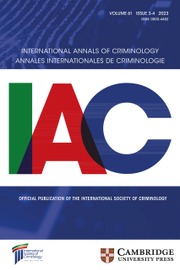No CrossRef data available.
Article contents
Fight against Corruption-Related Crimes in Wartime in Ukraine
Published online by Cambridge University Press: 22 November 2023
Abstract
The article aims to provide a comprehensive theoretical and practical analysis of the issues in the legal regulation of corruption prevention, study the state of the fight against corruption and the legalization of proceeds of corruption-related crimes under martial law, determine new corruption risks during a war, and suggest recommendations for their minimization. The authors of this article established the main problems that cause the emergence and spread of corruption in society and ways to overcome this phenomenon. The study’s results established that independent anti-corruption agencies and authorized law enforcement agencies have continued preventive and law enforcement activities even under war conditions, their purpose being to ensure the normal State functioning, the country’s defence capacity, and society’s security. In law-making and law enforcement activities, this research work can help to improve international relations between Ukraine and foreign countries in the context of the development of bilateral relations regarding the provision of assistance to Ukraine for post-war recovery, the attraction of investment, the fight against corruption, and possible accession to the European Union.
Abstracto
El artículo tiene como objetivo proporcionar un análisis teórico y práctico integral de las cuestiones en la regulación legal de la prevención de la corrupción, estudiar el estado de la lucha contra la corrupción y la legalización del producto de los delitos relacionados con la corrupción bajo la ley marcial, determinar nuevos riesgos de corrupción durante una guerra y sugerir recomendaciones para minimizarlos. Los autores de este artículo establecieron los principales problemas que causan la aparición y propagación de la corrupción en la sociedad y las formas de superar este fenómeno. Los resultados del estudio determinaron que los organismos independientes de lucha contra la corrupción y los organismos encargados de hacer cumplir la ley han proseguido sus actividades preventivas y de aplicación de la ley incluso en condiciones de guerra; su propósito era garantizar el funcionamiento normal del Estado, la capacidad de defensa del país y la seguridad de la sociedad. En las actividades legislativas y de aplicación de la ley, esta labor de investigación puede ayudar a mejorar las relaciones internacionales entre Ucrania y otros países en el contexto del desarrollo de relaciones bilaterales relativas a la prestación de asistencia a Ucrania para la recuperación de la guerra, atracción de inversiones, lucha contra la corrupción y posible adhesión a la Unión Europea.
Abstrait
L’article vise à fournir une analyse théorique et pratique complète des questions dans la réglementation juridique de la prévention de la corruption, étudier l’état de la lutte contre la corruption et la légalisation des produits des crimes liés à la corruption en vertu de la loi martiale, déterminer les nouveaux risques de corruption pendant une guerre et proposer des recommandations pour leur minimisation. Les auteurs de cet article ont établi les principaux problèmes qui causent l’émergence et la propagation de la corruption dans la société et les moyens de surmonter ce phénomène. Les résultats de l’étude ont établi que les organismes indépendants de lutte contre la corruption et les organismes d’application de la loi autorisés ont poursuivi leurs activités de prévention et d’application de la loi même dans des conditions de guerre; leur but était d’assurer le fonctionnement normal de l’État, la capacité de défense du pays et la sécurité de la société. Dans le cadre des activités d’élaboration de lois et d’application de la loi, ce travail de recherche peut aider à améliorer les relations internationales entre l’Ukraine et les pays étrangers dans le contexte du développement des relations bilatérales en ce qui concerne la fourniture d’une aide à l’Ukraine pour la reprise de la guerre, l’attrait des investissements, la lutte contre la corruption et l’adhésion possible à l’Union Européenne.
抽象的
本文旨在对预防腐败法律规制中存在的问题进行全面的理论和实践分析,研究戒严下打击腐败和腐败相关犯罪所得合法化的状况,确定战争期间新的腐败风险,并提出尽量减少腐败风险的建议。本文的作者确立了导致腐败在社会中出现和传播的主要问题以及克服这一现象的途径。研究结果表明,独立的反腐败机构和授权的执法机构即使在战争条件下也继续开展预防和执法活动;其目的是确保国家正常运作、国家防御能力和社会安全。在立法和执法活动中,这项研究工作有助于在发展双边关系的背景下改善乌克兰与外国之间的国际关系,这些关系涉及向乌克兰提供战后恢复援助、吸引投资、打击腐败和可能加入欧洲联盟。
مجرد
تهدف المقالة إلى تقديم تحليل نظري وعملي شامل للمسائل في التنظيم القانوني لمنع الفساد، ودراسة حالة مكافحة الفساد وإضفاء الشرعية على عائدات الجرائم المتعلقة بالفساد بموجب الأحكام العرفية، وتحديد مخاطر الفساد الجديدة أثناء الحرب، واقتراح توصيات لتقليلها. حدد واضعو هذه المادة المشاكل الرئيسية التي تسبب ظهور الفساد وانتشاره في المجتمع وسبل التغلب على هذه الظاهرة. وأثبتت نتائج الدراسة أن وكالات مكافحة الفساد المستقلة وأجهزة إنفاذ القانون المأذون لها تواصل الأنشطة الوقائية وأنشطة إنفاذ القانون حتى في ظل ظروف الحرب ؛ والغرض منها هو ضمان سير العمل العادي للدولة، والقدرة الدفاعية للبلد، وأمن المجتمع. وفي أنشطة وضع القوانين وإنفاذ القانون، يمكن أن يساعد هذا العمل البحثي على تحسين العلاقات الدولية بين أوكرانيا والبلدان الأجنبية في سياق تطوير العلاقات الثنائية فيما يتعلق بتقديم المساعدة لأوكرانيا من أجل الانتعاش بعد الحرب، واجتذاب الاستثمار، ومكافحة الفساد، واحتمال الانضمام إلى الاتحاد الأوروبي.
Keywords
- Type
- Article
- Information
- Copyright
- © International Society of Criminology, 2023


